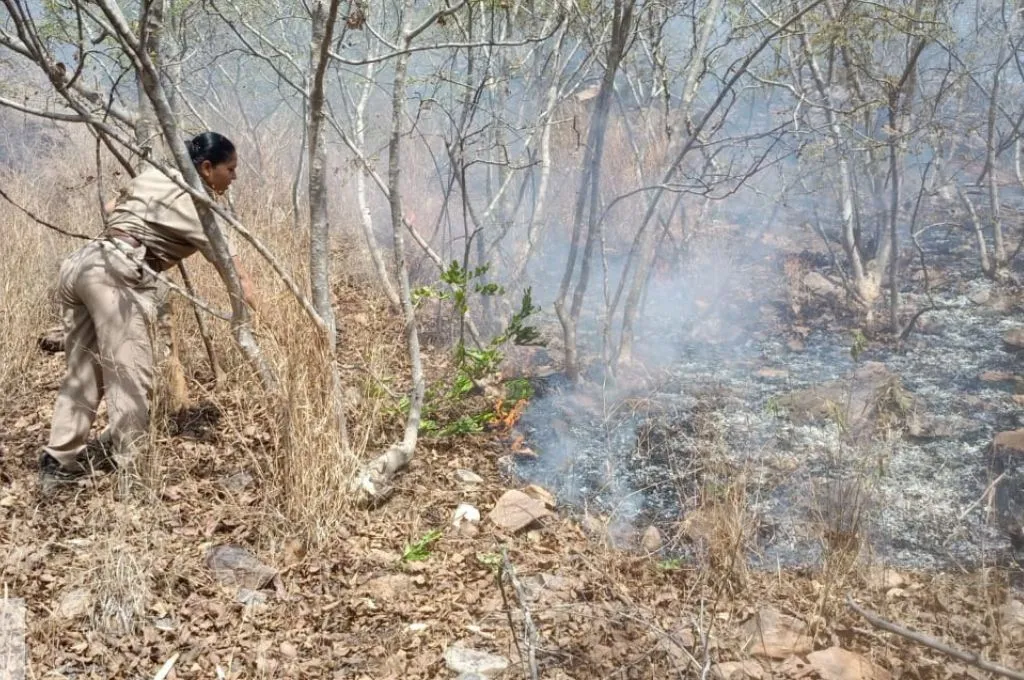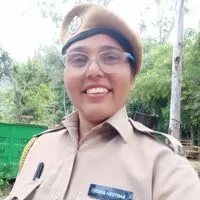My name is Santosh Kunwar and I work as a forest guard in Rajasthan’s Udaipur district. Every forest guard is responsible for overseeing one forest block; mine is Kargate. Earlier, I was posted at the Mewar Biodiversity Park near Chirwa village, where I worked from 2016 to 2024.
I was married off when I was just 14 years old, at which time I was in class 6. After marriage, I was forced to leave my studies and got stuck in a routine. Then I had my daughters. My husband, who used to do odd jobs, passed away soon afterwards. I lived with my in-laws for 12 years. During this time, I followed their rules–I stayed inside the house and refrained from going out, and did not study either.
This greatly impacted my self-confidence as well as my ability to think. My family believed that my life began and ended with my in-laws. To raise my children, who were very young then, I started working in people’s homes. In 2005, I joined an organisation called Seva Mandir. Initially, I used to perform cleaning and kitchen duties there. After some time, a few of my female colleagues who understood my situation pushed me to complete my education. But I lacked the confidence and would tell them, “I don’t know how people study. I have forgotten everything.”

Eventually, under their guidance, I started studying. Despite failing initially, I kept trying. I started with maths and then studied other subjects such as English. I still remember how I used to manage my time between raising children, working, and studying.
After completing my education, I started applying for government jobs, and took the examination and interview for the forest guard position. When I came to know that I had been selected, it was a very happy moment for me. In 2016, a new chapter of my journey began.

7 AM: I wake up early, finish household chores, and prepare breakfast. After years of shouldering multiple responsibilities, I now keep the mornings for myself. Usually, I leave home by 9 am and my first task is to patrol my area. After this, I interact with the local villagers. I feel that regular interaction with them is an important part of my job. Unless I talk to people, I will not be able to understand them. Often, it’s through them that I find out about encroachments or fires in the forest. Then I reach the spot and verify the news myself.
Each season brings its own challenges, and my schedule also changes accordingly.
Many times I hear people saying, “You are a woman so it will be difficult for you to do this work.” But I always explain to them that I know what my duties entail, and that I will reach out in case I need help. Sometimes people understand where I’m coming from, but sometimes it also leads to conflicts. Recently, a few individuals entered the forest at around 3 am to extract sandalwood (which requires permission from the forest department). When I received the news, I had to go to the spot alone and assess the situation. While handling such incidents improves one’s stature in the department, being a woman also means that the challenges you face become even more intense.
Each season brings its own challenges, and my schedule also changes accordingly. For example, in the summer we have to prevent and extinguish forest fires, while during the rainy season we work to create awareness among women in the village for tree plantation. In the winter months, there are restrictions on cutting wet wood, so we keep an eye out for that.


12 PM: I return from patrolling and share all the details I have gathered with the supervisor. This includes any difficulties that I’m facing in my work, or requirements such as the need for more staff. Any issues that have arisen are addressed appropriately. For example, if a wild animal harms someone somewhere, I make a report about it; if a local’s goat is killed by a leopard, we initiate the process of compensation; if an animal enters a village area, we put up a fence and then leave it safely in the forest. In this way, I do not have a fixed set of tasks because the scope of my work fluctuates every day.
When forest fires break out during the summer season, there’s no keeping track of day or night or even meals. Our entire focus is on saving the forest. However, there’s not much we can do immediately. Animals and birds get injured due to the fires, so I also try to help in their treatment.
While doing this work, I have learned that, along with government departments, the local communities can play a very important role during such disasters. They are more attuned to these forests than us. That is why I always try to connect with the people living in the areas surrounding the biodiversity park. I visit the homes of women from the local communities, and I teach their girls whenever I get time. Initially, I taught them counting with pebbles and then the Hindi alphabet. Such activities help build trust with the community, so we feel comfortable with each other.
My interactions with people have helped me understand the problems they are facing. What do they do if there is a forest fire? Or why do they go so deep into the forest to collect wood? Arriving at this understanding definitely takes some time but once it happens, the people and the department can work together. For instance, if there is a fire in Amberi today, I am confident that the residents will work with the forest department to extinguish it. In addition, the young girls who have gained awareness as a result of the actions we have taken have now started making entry tickets for the park.

5 PM: Usually, I am on my way back home at this time. But sometimes there may be an emergency, so I have to remain on duty. Recently, some people from the village were doing construction on the forest boundary. When we reached there to explain to them that they could not build at the site, they got angry and said that since they had leased that land, they would continue their work. It’s important for us to exercise patience in such situations. We explained to them that they can continue with their construction, but the patwari would be called for an inspection the next day. They calmed down upon hearing this.
Being a forest worker, I fail to understand why people have this habit of taking pictures with wild animals.
Sometimes we are also tasked with rescuing or treating injured wild animals. We must be alert if they enter nearby human habitations. Sometimes, when we cage a leopard, a huge crowd gathers. It requires patience to control the crowd. Being a forest worker, I fail to understand why people have this habit of taking pictures with wild animals or going near their enclosures. We talk about animal conservation but do not change our behaviour. Government employees and local communities alike need to be better informed.
9 PM: I finish my household chores, such as cooking, eating, and cleaning the kitchen. If I get the time, I talk to my relatives, including my sisters and my children, on the phone. Having been through an extended bad phase in my own life, I feel that I should support women who are in similar situations right now. I believe that in such situations it helps to join a civil society organisation. Doing so opens up options for women and can facilitate connections with like-minded people. It also gives them the confidence to speak their minds.
As told to IDR.
—
Know more
- Learn about the importance of community forest management in preventing wildfires.
- Read about how a young woman is helping her community save the forests.




